- Home
- Marie Rutkoski
The Hollow Heart Page 4
The Hollow Heart Read online
Page 4
My father shifts uncomfortably in his saddle.
“She did run through all the ladies here,” Roshar says.
And there we have it: my third skill.
Roshar smiles at me over his shoulder. “A rake after my own heart.”
I tip my head to him, every bit the arrogant wastrel my father has cautioned me not to be. It is bad behavior in one so recently and easily forgiven, but I simultaneously do not like my father’s silence, and want to prove that it does not bother me.
The villa glows under the rising sun, the windows winking. Its set of peaked roofs rise and fall, sloping down to the west. The glass atrium is a pointed jewel. As my boots crunch gravel covering the walk, the front door opens, and a tall, gray-and-black-haired woman stands on the threshold. Sarsine, my father’s cousin and chief counselor, looks much like him. Same steely hair, same gray eyes. Bold brow and large hands. Her craggy face hardens with disapproval as she appraises me.
I brush imaginary dust from the shoulders of my jacket, a man’s garment I had made for me in Ethin. I tug at the cuffs. My boots are less than shiny. Still, I can play my part. Ne’er-do-well, Sarsine silently calls me. Bad apple.
Fine. I am.
I grin at her behind my father’s back as he and Roshar enter the villa. “Better late than never,” I whisper sideways.
“Better never, or so some have said in your absence.” Sarsine holds my gaze as I hear the men’s footfalls diminish into the villa’s interior. “You wasted countless resources in our search for you. Your parents grieved each day you were gone. Yet here you stand, smiling cheerfully, without a care in the world. Arin let you off easy, I see.”
“No one can hold anything against me for long. I am too adorable. It is my handsome face. My winning charm. All the ladies say so.”
Sarsine looks as though she would like to slap me. “May the heart you break one day be your own.”
I do not give Sarsine the satisfaction of knowing her curse has already come to pass.
* * *
I linger in the salon where my mother’s piano hulks, its shining black shape as big as the boulder of guilt that rests on my chest. I touch the keys lightly, soundlessly, remembering my awe as a child to see my mother play, the simple harmonies I initially produced, how I grew in skill only to realize that I would never be more than merely good. For a few moments, I do not know how long, I believe the disquiet in my belly is shame, but then I realize it is more than that. It is fear of seeing her. Frustrated with myself, annoyed with the salon’s stillness, how it now seems like a smug, knowing witness to my cowardice, I bound up the stairs to the east wing, boots loud on polished oak.
On the outermost door to my mother’s suite, the kestrel carved into its wood peers down at me with narrow-eyed reproach, its expression dangerous though its body is small, its wingspan dainty, its tailfeathers spread in a dark-patterned fan. The door is not locked. My heart raps against my ribs. The indigo flowered rug of the empty greeting room deadens the sound of my boots. The quiet reminds me that my mother might be sleeping. I must not wake her. I walk softly but swiftly through her suite, hoping I can make everything right, that the queen’s forgiveness will be as easy to receive as the king’s. Nothing has been done that cannot be undone, surely. My mother will be well again. She will recover from this sickness. It is a matter of time. She is Queen Kestrel, master of spies. She survived so much. She is daunted by no one. Nothing.
I lift a vow to the god of souls, in whom I half believe. The god, who rules love, brokers deals for what mortals want most. Save her, I plead, and I will marry to please my parents.
As I move through each gray-and-pearl-colored room of the suite, I imagine telling my mother my vow. She will smile, and love me like she once did.
I pause before her bedchamber. The door is ajar. Beyond it, the tiny form of my mother rests under mounds of blankets though it is not so cold; autumn is not here yet. She has the body of a child. I shot up past her years ago. Towering over her used to give me some satisfaction, but now she looks too small, like she will dwindle away. Her loose hair, undulled by age, is a fire against the bedsheets. Her dagger, normally worn at her hip as I do mine, hangs from its hook on the bedpost. My father kneels next to the bed, his back to me, his hand on hers, his shoulders bowed. My mother doesn’t see me standing at the door. She sees only him. Her whisper reaches me: “I don’t want to die.”
“Little Fists.” My father’s voice is rough. “You won’t die.”
“I don’t want you to grieve. I don’t want to leave you alone in this world.”
My father is silent. I know without seeing his face what is there: his devastation. His large fingers trace the thin gold ring on her smallest finger. He made it for me, my mother told me, her face luminous with memory.
My mother says, “Who will protect you when I’m gone?”
My father, all muscle and strength, gently presses his face into her palm.
“I worry,” she says.
His shoulders lift and fall. Hurt burns my throat. I am like my father and mother: full of grief. And I am me, too: so jealous. I know it is wrong. Selfish. But I wish my mother worried about me, that it was me she wanted to protect, for me that she wished to live.
I know I am second best. I cannot measure up to their love for each other. Yet I want to be at least enough.
“Sid has returned,” my father says.
“She has?”
“You must not worry. You will live. And I have her.”
My mother sighs. “No,” she whispers, “you don’t.”
* * *
When I enter my rooms, which were my father’s rooms when he was a child, before the invasion, when Valorian soldiers forced their way into this house and murdered his family, I find Emmah going through my wardrobe, unwrapping my clothes from their tissue paper shrouds. The paper rustles as she catches sight of me and grips the clothes. Her deeply wrinkled face splits into a smile. “Sid! You sneak. How dare you skulk away for months on end!” She offers her cheek. “Come and give your nurse a kiss.”
I do, grateful that if she sees anything wrong in my expression, if she can sense how my mother’s words stamped down into my chest, heavy as a war horse’s hoof, she makes no mention of it. She still wears the little gold earrings I made for her when I was a child. My father refused to teach me how to blacksmith, saying he did not like to remember how he’d been forced to learn the skill, and no child of his would be made to work. I argued that this was not smithing, it was jewelry making, and if he had made my mother’s ring, surely he could help me. I want to make something Emmah loves, I said, and he smiled, and said, All right. Emmah cried when she unfolded the velvet I had wrapped around her Ninarrith gift.
She holds my face between her palms, green eyes shining. They are pretty, and make me wonder, as I often have, how she looked before the war. Her wrinkles were not caused by age—she is no older than my parents—but by fire or acid. Once, when I was little, I asked my parents what happened to Emmah. You must never ask her, my mother ordered, appalled. More gently, my father explained that we could not expect to know all that the Herrani had suffered during the invasion, when General Trajan, my Valorian grandfather, conquered this country and enslaved its people, or during the decade of colonization that followed.
You love Emmah, don’t you? my father said.
I nodded.
Then don’t pry.
But Roshar has scars on his face, I said. And I love him, and I asked him, and he told me.
What did he say?
That Arin did it, I answered. When I saw my parents’ startled expressions, I hastily added, I mean, Arin the tiger. Not you, Etta. Roshar said his tiger did it, that bad boy.
Dear one, my mother said, Roshar lied.
My father touched my cheek. He explained, Some truths are too hard to say.
“What a fright you gave me,” Emmah says. “You could have gone down in a shipwreck! You could have fallen in love with some girl and never re
turned!”
“Never.” I ignore the twitch of pain in my chest. I ignore the heat in my belly, my chest, my throat, as I remember peeling away Nirrim’s dress to kiss her skin. The feel of her body beneath mine, the way her eyes slid shut with pleasure. Nirrim’s eyes resemble Emmah’s, though Nirrim’s are larger, more luminous. Greener: a leaf lit by the sun. Look at me, I told Nirrim as I touched her. Open your eyes. She did, and I was lost.
No more. The memory is punishing. I must forget Nirrim. At least, I must do my best. Trying on a sly smile that feels fake but is familiar, because I am performing an old version of myself, I tell Emmah, “I am too canny a sailor to be sunk, and the god of souls knows I am too delicious to be given to one woman. I must be shared.”
Emmah turns serious, hands falling to her sides. “Have you seen your mother?”
I toy with a bit of downy tissue paper. It is tishin paper, made from pounding the stems of mulberry trees and soaking the pulp in a vat of water and hibiscus sap. Incredibly thin and sheer, tishin is barely paper. It feels the way clouds look. Made a little thicker than what I hold between my fingers, it can be used for paper lanterns. A little thinner, and my mother can use it for her own purposes. Watch, she once told me, laying an airy sheet of tishin over a page filled with writing. The writing vanished, and appeared to be a blank page that could easily be stitched into the final pages of an innocent-seeming book shipped along with its secret message to the recipient, who would scrape away the tishin to reveal the words beneath. Even paper, my mother said, has its secrets.
I think about the paper, and not the way my eyes burned to hear my mother dismiss me to my father as though I were tissue-thin. Next to nothing.
“Well?” Emmah presses. “Did you see the queen?”
“Yes.”
“Don’t lie to me.”
“I did see her. She simply didn’t see me.”
“Let’s choose something suitable for you to wear, then, to visit her again.”
My gaze flicks warily to the dresses gathered together like flowers.
“Something you like,” Emmah corrects herself, and reaches for a Herrani men’s jacket: deep blue, with a high collar. My lungs loosen. It means something, that Emmah knows who I am and has never tried to change me. It gives me the courage I need.
* * *
My mother’s eyes are closed when I enter her bedchamber. I am clean from a bath, sea salt scrubbed from my skin. My boots are glossy black leather, my jacket tight across my chest, a Valorian dagger heavy on my hip. I refuse to kneel by her bedside the way my father did. She and I are alone in her bedchamber, and as she sleeps I take this moment to study her. I am glad my features are not so delicate. Even now, with the pallor of an invalid, she is beautiful. Beside her, on the dove-gray wood of the nightstand, rests a speckled yellow feather that I have sometimes seen in my father’s suite, sometimes seen in hers. It is a kind of code between them. What it means, I will likely never know. My parents might as well have their own language.
Her eyes flick open, startling me. I can’t tell whether she was faking sleep, or if her intelligence is such that even her dreams can’t keep her from sensing that for one moment, I had the advantage and was able to study her without her studying me.
“Sidarine.” Her voice is weak.
“Sid,” I correct.
She nods slightly, golden hair brushing the pillow. “Sid,” she says, and I feel petty for forcing her, in her illness, to use my little name. But she knows my preference. It is not new, and she is too smart to pretend she forgets. “I need to tell you something,” she says.
“Yes?” I try to keep the eagerness from my voice. Is it that she missed me? That she is glad I’m home?
“You cannot tell your father.”
Gods in their heaven. Never, to my knowledge, has my mother shared a secret with me that she kept from him. I bend closer. I find that I am ready to kneel, to hear her better, and stop myself just in time.
She must notice; she smiles. “I need my spy.”
“I quit being your spy.”
“I can’t tell Arin,” she continues, as if I hadn’t spoken. “He will raze Herran looking for the culprit.”
I crush my disappointment into a ball inside my chest and make my voice sound bored. “You are stringing me along, trying to stir my curiosity so that I become desperate for your secret, when really you’re assigning another job for me to do. Might as well say what it is.”
“I am not sick,” my mother says. “I have been poisoned.”
NIRRIM
A FULL MOON POURS ITS silver over the city, whitening the pavement as I leave the Ward. I pass through the ruins of the wall, stepping carefully through the rocky debris. Cheers erupt behind me, the sound large yet softened by distance. A few minutes later, as I enter the Middling quarter, with its modest yet pretty houses, lit by blue-paned lanterns, the cheers echo again from the agora. Aden selected the prisoners to be executed, beginning with several councilmembers. They had once ruled over all of Ethin, acting in the name of the Lord Protector, whom we believed was elected by the Council whenever the former Lord Protector died. Instead, he had been the god of thieves, punished by the pantheon of gods to watch over this island. Every generation, the god of thieves pretended to be a new Lord Protector, risen from the ranks of the Council, and stole everyone’s knowledge of the truth.
The Council is complicit, Aden said, and I agreed. Only High Kith could become councilmembers, and they saw to it that their laws were ruthlessly enacted. If a Half Kith wore sandals that were too nice, the leather too smooth, by the Council’s orders she could be arrested, her toes lopped off one by one. If a Half Kith dared to leave the Ward, and was caught, as Aden’s mother had been long ago, the sentence was death. Their blood will spill in the agora, Aden said, as red as the Council robes they once wore.
Kill all the councilmen, I told him.
And all the High Kith.
I felt a prickle of annoyance. No. I said ten percent.
That is too little.
Don’t do this, said that voice inside, that other, old version of myself.
Silence, I tell her. I do not listen to you. My resistance to Aden was not out of guilt, or some ghost of my former self. It was because I had given Aden a clear command, and he had decided to act as if he knew better. “Ten percent only,” I told him. “Do as I say, or I will add you to the tithe.” He smirked as though I had been joking, his smile edged with resentment, but he agreed.
Another burst of cheering comes from the agora, even fainter now.
In the Middling quarter, the streets are empty, the houses’ shutters closed, though one shutter creaks open, revealing a child in the window, his head just above the sill. His eyes widen when I meet his gaze. A hand from behind snatches his shoulder and drags him back into the room’s darkness—to protect him, I suppose, from me. My people, free now, are roaming the street, dragging High Kith from their homes.
And what of the Middlings? Aden said.
I have not yet decided.
They carried out High-Kith orders. The Middlings are just as guilty. They must be punished, too.
I lightly touched his cheek and let my power shudder into his skin, giving him a memory as fresh as though it were present, not past. I made him remember when I rejected him, and said I would never marry him. He flinched away. Do not make me repeat myself, I said.
Fatigue drifts up my body. I do not know when last I slept. I remember how Sid, when I first met her, and I huddled in the prison cell opposite hers, had fought sleep. She held it off as though it were no burden to do so, as though it were an entertaining game, and she enjoyed wakefulness. She claimed her people had trained to get by on little sleep. That could very well have been true, yet Sid was skilled at using the truth to hide the truth. Now I know that she stayed awake to protect me. She kept a watchful eye while I slept.
My breath is shallow, my ribs tight. I am not inexhaustible, it seems. The power I have used comes at a price, though
I was able to affect greater numbers in the attacking army with my power than Aden could with his. Rinah tore down the wall with her magic, but she collapsed soon afterward, and is still sleeping. Aden looked terrible after the battle, his skin dull, eyes stamped with dark circles, and it is possible he didn’t resist my orders because he lacked the energy to do so. I am not exhausted, yet my feet feel as though they are made of stone, and I lug them up the hill toward the High quarter, toward the house I shared with Sid.
The keys rest in the pocket of my frayed and dirty dress, which I have worn since the night Sid left me. The silk is the color of the sky just before it deepens to true night. The keys tap against my thigh, light as Sid’s fingers.
The High quarter screams. Terrified cries ring out into the streets as my soldiers haul High-Kith lords and ladies from their homes. It is as if the buildings themselves are shrieking. I survey the scene with pride, catching the eyes of my loyal people, their expressions aglow. The god of vengeance must smile down upon us, to see what I see.
Flames blaze against the horizon. Half Kith have set a palatial home on fire, and while I make a note to forbid this sort of thing—it is a waste of resources, of luxuries we now claim as ours—I decide to allow my people’s entertainment for now. They had nothing for so long. What could be wrong with a little fun for them, this one night? Their loyalty to me will only grow with it, for it was I who gave them this pleasure.
And yet—a feeling like panic pinches my lungs—Sid’s house must not be touched. I hasten to it, worried about both the house and my need to preserve it, but I decide the need is because the house belongs to me, not to Sid, at least not any longer. I beckon one of the Half-Kith men I recognize from the Ward and order him to spread the word that the narrow house on the steep hill with the view of the sea, which Sid chose because she cared more for the extravagance of the view than the extravagance of the accommodations, is to be spared. “There is no one there,” I tell him. “Not anymore.”

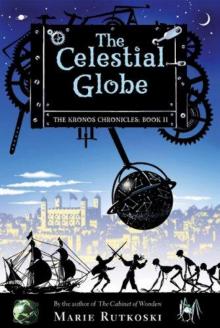 The Celestial Globe
The Celestial Globe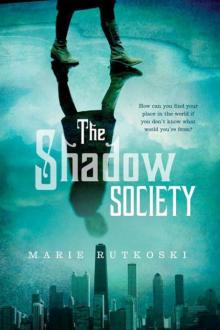 The Shadow Society
The Shadow Society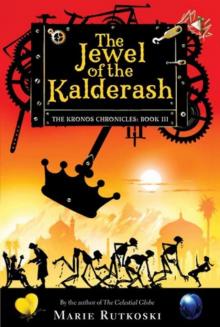 The Jewel of the Kalderash
The Jewel of the Kalderash The Winner's Kiss
The Winner's Kiss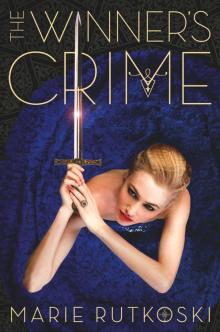 The Winner's Crime
The Winner's Crime The Winner's Curse
The Winner's Curse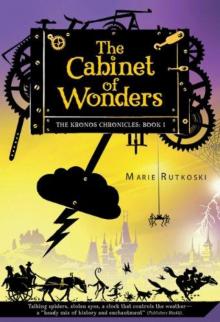 The Cabinet of Wonders
The Cabinet of Wonders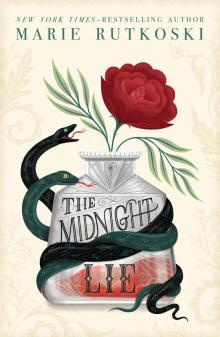 The Midnight Lie
The Midnight Lie The Hollow Heart
The Hollow Heart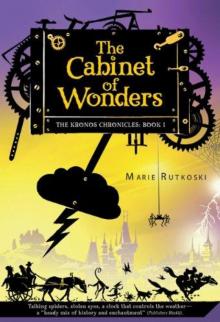 The Cabinet of Wonders: The Kronos Chronicles: Book I
The Cabinet of Wonders: The Kronos Chronicles: Book I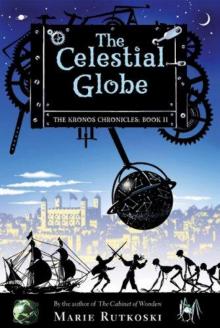 The Celestial Globe: The Kronos Chronicles: Book II
The Celestial Globe: The Kronos Chronicles: Book II